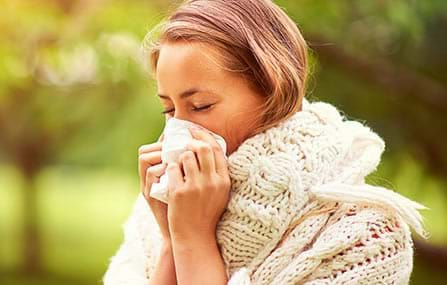
If you have allergic rhinitis (nasal allergies), your immune system mistakenly identifies a typically harmless substance as an intruder. This substance is called an allergen. The immune system responds to the allergen by releasing histamine and chemical mediators that typically cause symptoms in the nose, throat, eyes, ears, skin and roof of the mouth.
Seasonal allergic rhinitis (hay fever) is most often caused by pollen carried in the air during different times of the year in different parts of the country.
Allergic rhinitis can also be triggered by common indoor allergens such as the dried skin flakes, urine and saliva found on pet dander, mold, droppings from dust mites and cockroach particles. This is called perennial allergic rhinitis, as symptoms typically occur year-round.

In addition to allergen triggers, symptoms may also occur from irritants such as smoke and strong odors, or to changes in the temperature and humidity of the air. This happens because allergic rhinitis causes inflammation in the nasal lining, which increases sensitivity to inhalants. Many people with allergic rhinitis are prone to allergic conjunctivitis (eye allergy). Allergic rhinitis can make symptoms of asthma worse for people who suffer from both conditions.
Skin testing is the most accurate method of testing for allergies. Occasionally if skin testing cannot be performed, a blood test may be ordered.
Once specific allergens are diagnosed, an allergist will work with you in developing a plan to avoid allergens that trigger your symptoms. For example, if you are allergic to dust mites or indoor mold, you will want to take steps to reduce these allergens in your house to the extent possible. Complete avoidance is often not possible; therefore, treatment is usually necessary. Numerous medications are available to treat nasal and eye allergies. The selection of proper medication(s) depends on patients' symptoms, results of the allergy testing, and several other factors. Immunotherapy (allergy shots) is a proven treatment approach providing long-term relief for many people suffering from allergic rhinitis.